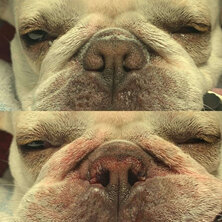Phoenix Animal Wellness
At PAW we have gathered together a group of dedicated animal health professionals who are committed to providing outstanding, innovative, value for money care.
BOAS is a complicated syndrome resulting from multiple abnormalities within the upper and lower airways. BOAS is associate with the short faced breeds such as Pugs, French Bulldogs, British Bulldogs and Shih tzus. Some of these abnormalities can be improved with surgery (e.g. narrow nostrils, overly long soft palate).
What are the common signs of Brachycephalic Obstructive Airway Syndrome (BOAS)?
Decreasing the resistance in the airways even marginally can have a dramatic effect on the airflow in and out of the dog’s lungs.
Many dogs suffering from BOAS symptoms will have concurrent gut issues. This is due to increased pressure in the chest ‘sucking’ the stomach forwards, this results in symptoms such as regurgitation, vomiting, oesophagitis and laryngitis. After surgery many of these symptoms will also resolve or be improved.
If you think your dog may be suffering from BOAS and would benefit from surgery, book a consultation with Paula to find out more.
BOAS Surgery
Boas corrective surgery can improve some of the abnormalities associated with the condition:

1. External Nares, we can open the external nostrils to enable better airflow at the opening to the respiratory tract.
Before
After
2. Shortening the soft palate: using specialised equipment the soft palate can be reduced in size to prevent it dangling into the airway and causing turbulence and blockage.
3. Soft Palate Thinning: in some dogs, notably mature British Bulldogs the soft palate is very thick as well as long. Using specialist equipment and careful surgery the palate can be thinned and shortened in a single procedure.
4. Everted Lateral Saccules: These can be removed to reduce the obstructive effect in the larynx
There are of course risks associated with these surgeries but by using specialise instruments and procedures and by careful regulating of anaesthesia, including use of oxygen cages, we can minimise these risks.
What to expect on the day of surgery?
You pet will have started a course of omeprazole to reduce stomach acid a few days before the surgery.
Your dog will be admitted in the morning without food from the night before. Antivomiting drugs will be administered and a premed adapted to your dog’s breathing.
Your dog will then be placed in an oxygen cage whilst he or she gets sleepy. A full general anaesthetic will be administered, and you pet positioned for surgery.
The soft palate is shortened or thinned first, and then the laryngeal saccules removed if necessary. An ice pack will be placed inside the mouth to reduce swelling, whilst the nasal surgery is performed.
You dog will be given anti inflammatories, pain relief and continued oxygen during recovery.
Most dogs make a smooth recovery and can return home the same day.